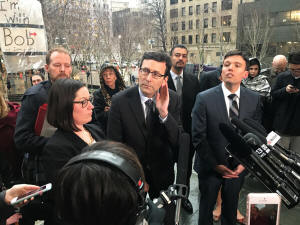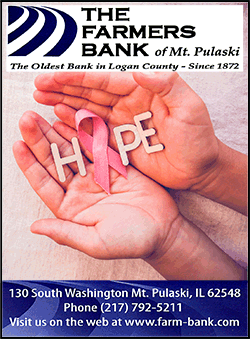McKesson, drug distributors face $95 billion opioid trial in Washington
state
 Send a link to a friend
Send a link to a friend
 [November 15, 2021]
By Nate Raymond [November 15, 2021]
By Nate Raymond
(Reuters) - A trial pitting Washington
state against McKesson Corp and two other drug distributors accused of
fueling the U.S. opioid epidemic is slated to kick off on Monday, after
the state's attorney general declined to join a $26 billion nationwide
settlement.
Washington Attorney General Bob Ferguson has accused McKesson, Cardinal
Health Inc and AmerisourceBergen Corp of creating a public nuisance by
failing to prevent the diversion of prescription pills into illegal
channels.
Washington is seeking $38.2 billion to fund treatment and other programs
and billions more in penalties and forfeited profits. The distributors,
who deny wrongdoing, say the state wants a "wildly inflated recovery" of
more than $95 billion.
More than 3,300 lawsuits by largely state and local governments have
been filed seeking to hold those and other companies responsible for a
drug abuse crisis the U.S. government says led to nearly 500,000 opioid
overdose deaths over two decades.

Washington state would have been eligible for $527.5 million if it had
joined a proposed global deal, under which the distributors would pay up
to $21 billion and drugmaker Johnson & Johnson would pay $5
billion to resolve the cases.
Ferguson, a Democrat, has criticized the settlement as "not nearly good
enough," saying the nearly $30 million on average the state and its
communities would receive annually was insufficient to address the
devastation caused by the epidemic.
The state became one of eight to not participate in the
distributors' nationwide accord and opted to proceed to trial.
[to top of second column]
|

Washington state's attorney general Bob Ferguson (C) speaks to the
media next to Washington state solicitor general Noah Purcell (R)
outside the U.S. federal courthouse in downtown Seattle February 3,
2017. REUTERS/Dan Levine

"Washington families devastated by the opioid
epidemic deserve their day in court," Ferguson said in a statement.
The companies deny wrongdoing, arguing that the increase in pills
was due to rising prescriptions and other factors and that they had
systems in place to prevent drug diversion. They argue that
distributing regulated drugs cannot support a public nuisance claim.
Plaintiffs in some of the other opioid cases have recently faced
setbacks pursuing nuisance claims.
Oklahoma's top court on Tuesday overturned a $465 million judgment
against J&J, and a California judge this month ruled in favor of
four drugmakers in a case brought by several large counties.
The distributors are awaiting a decision in a similar case in West
Virginia following a trial. Closing arguments are expected Monday in
Ohio in the first trial pharmacies have faced over the epidemic.
(Reporting by Nate Raymond in Boston; Editing by Noeleen Walder and
Jonathan Oatis)
[© 2021 Thomson Reuters. All rights
reserved.] Copyright 2021 Reuters. All rights reserved. This material may not be published,
broadcast, rewritten or redistributed.
Thompson Reuters is solely responsible for this content.
 |